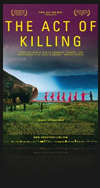
| Capsule Review
The Act of Killing (2013)

Directed by Joshua Oppenheimer; co-directed by Christine Cynn.
2013 – 122 minutes
Not Rated: (equivalent of an R for violence).
Reviewed by Dustin Putman, July 23, 2013.
|
In 1965, the Indonesian government was overthrown by the military. Anyone who opposed this dictatorial "New Order" were viewed strictly as communists and killed by paramilitaries and gangsters. By the time this period of shameful genocide subsided a year later, more than 500,000 people had been exterminated. A thoroughly bizarre and frequently unsettling documentary from filmmaker Joshua Oppenheimer and co-director Christine Cynn about a piece of Indonesian history usually swept neatly under the rug, "The Act of Killing" picks up in present times with several of the men responsible for these murders. They are tasked with recreating their worst crimes for the cameras, coloring them up along the way with ornate costumes and lavish musical numbers like sick pseudo-snuff films come to life.  |
"The Act of Killing" is about appalling people bereft of a moral compass and the ability to comprehend the extent of the cruel and awful things they've done in their lives. The human subject the picture most closely follows is Anwar Congo, a former "movie theater gangster" and the founder of right-wing paramilitary organization Pancasila Youth, currently boasting a staggering count of three million members. Congo nonchalantly discusses the ways he used to kill—wire, he says, was far easier than rope to wrap around a person's neck because the victim wouldn't be able to grab ahold of it and it would cut right in without causing a huge mess—with the good nature of someone handing out cooking tips. When he agrees to simulate his own death on-camera (he smilingly calls over his young, impressionable grandchildren by saying, "Watch your grandpa getting tortured and killed!"), it is only after he shoots it that he starts to get a sense of the fear and helplessness that the thousands of people—sometimes entire communities—felt when he was about to slaughter them.  |
The use of archival footage and a little more background information about the Indonesian death squads and the landscape of eviscerated bodies they left in their wake might have gone a long way in filling in the gaps for uninitiated viewers of "The Act of Killing." If director Joshua Oppenheimer occasionally loses his way in his own narrative, leaving key details out while concentrating on less-critical minutiae, where this picture demands attention is in its chilling portrait of indoctrination and evil, those responsible for so many deaths taking for granted the value of life itself. Once Congo finally, finally gets a taste of the magnitude of what he's done after decades of not processing it—only to be told what he felt wasn't half as bad as what his victims felt because, for them, it was really happening and not just a put-on for cameras—"The Act of Killing" hits an emotional cord as unblinkingly grim as it is wholly necessary. It's the catharsis the viewer has been waiting for all along. Unfortunately, the most potentially interesting material—how Congo deals with this self-awakening—is not captured, occurring after the end credits have rolled.
|



